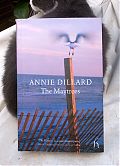
Annie Dillard
The Maytrees x 2
She longed for the life she already possessed, a life as large as clouds’.
The Maytrees around a second reading lost none of its indelible power. How has Annie Dillard done it? Or, can I see through text to the secret of her words? Maybe I’ll put the pages in a blender, puree then drink them; maybe I’ll sleep with the book under my pillow. Though I know any major attempt to pick apart a work tends to destroy it, with The Maytrees I’m tempted.
Various clues to various courses in Annie Dillard’s writing can be picked up while poking the internet. She abhors the passive voice, simultaneously proud of abundant verbs, which creates a very active ambiance. She employs poetry, rhymes and repetitions. She is a superb slicer and snipper: The Maytrees began at 1200 pages and now reads at a sweet 200. But I also know writing has no recipe and anyone who sticks by these ingredients but Annie Dillard herself will produce nothing but bland macaroni. Each to our own down our own path. Did I mention, Annie Dillard’s not writing anymore? The Maytrees is the end of the inning.
I know there is no secret, only work and fermentation of voice, painstaking development of the story. The Maytrees encompasses the universal: birth, love, birth, loss, love, death. Besides from these major life-events, nothing much “happens.” I have to wonder how the thousand pages were folded into the remaining supine sentences. Nothing needed, nothing extra. The effect of a single sentence’s unfolding, rocking on its current, is as mesmerizing as it is awakening.
Their intimacy flooded. Love like a tide either advances or retreats, Maytree opined into a recent notebook. Their awarenesses rode waves paired like outriggers.
I have to wonder, was the creation of Lou and Toby’s love simply to destroy it? It seemed so harsh (even knowing it was coming), after such long beautiful paragraphs of convincing he could still up and leave her.
Other things that newly struck me: the difference between old-Lou and old-Deary, Maytrees’ incessant love questioning and his conclusions regarding old-Lou and old-Deary, the end’s frequent mention of beauty. What I lauded in again like the first time: the firmament, again the earth, the sea, love and loss, Lou’s solitude and her struggle for an aware consciousness.
I began this second reading wishing to dive deep into Annie Dillard’s inscrutable writing, instead, I was again washed into it by the completeness and the poetry. When a book does not fade from re-reading and re-reading in near succession, but gains and is as alive as it was the first time then I know that it will be as alive for me fifty years hence: Timelessness. (Maybe tonight I’ll try sliding The Maytrees under my pillow.)
· · · · · · · · · · · · · · · · · · · ·